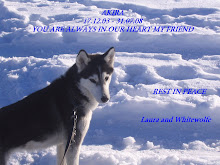Today a post about the Ojibway spirit

Nanabooshoo
(also Nanabush, The Great Hare, Manaboju, The Great Trickster):
This prominent figure in Chippewa oral tradition supposedly taught the
Native Peoples all their chief social functions, including hunting, fishing,
canoe building and face painting.

Kitchi Manito (also Gitchee Manito):
The Supreme Being; the Creator; the Great Spirit.
Matchi Manito:
The Evil Spirit,
who takes the form of a great fish or two-tailed merman,
the Great Lynx or something evil that lives in the lake.
The Winds:
The other four spirits
(four is an important number among the Chippewa)
are the East, West, North and South winds.

THE ORIGINS OF NANABUSH

In the beginning, as the Ojibwa story tellers say,
the world in which we live did not exist.
Kitchi Manitou, the Great Spirit,
had a dream in which he saw a world made of mountains
and valleys, lakes and streams, plants and animals,
and people. In his wisdom Kitchi Manitou realized
that he was to bring these things into being.
He created a world made of four primary elements;
rock, water, fire and wind:
To the sun he gave the power
to heat and light the earth,
To the earth he gave the power
of growth and healing,
To the water he gave purity and renewal,
To the wind he gave music
and the breath of life itself,
After these things Kitchi Manitou
created human kind.
To them he gave the power of dream.
As the world was new,
the Ojibwa people had much to learn
and Kitchi Manitou took pity on them
and sent them a teacher, Nanabush.
Nanabush was the son of a human mother
and the West Wind spirit father.
He was sent to earth to teach his people
about the healing plants, about kindness,
generosity, and honesty.
One of Nanabush's first tasks was to name the trees,
the waters, the mountains, the animals,
the birds and the plants.

Nanabush had powerful magic to give special powers
or attributes to the animals and plants.
Nanabush was also a Trickster,
bent on making humans look silly
(although his own jokes often backfired on him).
As a Trickster, he could change form
and take the shape of an animal.
The one distinguishing feature of Nanabush
when he was in human form, as drawn on rocks
and carved in stone by the Ojibwa,
was his rabbit-like ears.
Miigweech ("thanks")
~U-ne-ga-wa-ya~
























1 comment:
Hi Une,
I'm leaving a comment for Laura. I found a blog that I thought she might enjoy looking at. A young lady, seven years old, living in USA:
http://oliviasfairyforest.blogspot.com/
Take care and pats to Cheyenne!
Post a Comment